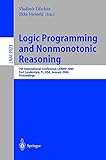Logic Programming and Nonmonotonic Reasoning [electronic resource] : 7th International Conference, LPNMR 2004 Fort Lauderdale, FL, USA, January 6-8, 2004 Proceedings / edited by Vladimir Lifschitz, Ilkka Niemelä.
Material type: TextSeries: Lecture Notes in Computer Science ; 2923Publisher: Berlin, Heidelberg : Springer Berlin Heidelberg, 2004Description: X, 370 p. online resourceContent type: text Media type: computer Carrier type: online resourceISBN: 9783540246091Subject(s): Computer science | Artificial intelligence | Computer Science | Artificial Intelligence (incl. Robotics) | Programming Techniques | Mathematical Logic and Formal LanguagesAdditional physical formats: Printed edition:: No titleDDC classification: 006.3 LOC classification: Q334-342TJ210.2-211.495Online resources: Click here to access online
TextSeries: Lecture Notes in Computer Science ; 2923Publisher: Berlin, Heidelberg : Springer Berlin Heidelberg, 2004Description: X, 370 p. online resourceContent type: text Media type: computer Carrier type: online resourceISBN: 9783540246091Subject(s): Computer science | Artificial intelligence | Computer Science | Artificial Intelligence (incl. Robotics) | Programming Techniques | Mathematical Logic and Formal LanguagesAdditional physical formats: Printed edition:: No titleDDC classification: 006.3 LOC classification: Q334-342TJ210.2-211.495Online resources: Click here to access online  E-BOOKS
E-BOOKS
| Current library | Home library | Call number | Materials specified | URL | Status | Date due | Barcode |
|---|---|---|---|---|---|---|---|
| IMSc Library | IMSc Library | Link to resource | Available | EBK3066 |
Invited Papers -- Constraints and Probabilistic Networks: A Look At The Interface -- Toward A Universal Inference Engine -- Towards Systematic Benchmarking in Answer Set Programming: The Dagstuhl Initiative -- Regular Papers -- Semantics for Dynamic Logic Programming: A Principle-Based Approach -- Probabilistic Reasoning With Answer Sets -- Answer Sets: From Constraint Programming Towards Qualitative Optimization -- A Logic of Non-monotone Inductive Definitions and Its Modularity Properties -- Reasoning About Actions and Change in Answer Set Programming -- Almost Definite Causal Theories -- Simplifying Logic Programs Under Uniform and Strong Equivalence -- Towards Automated Integration of Guess and Check Programs in Answer Set Programming -- Towards Automated Integration of Guess and Check Programs in Answer Set Programming -- Graphs and Colorings for Answer Set Programming: Abridged Report -- Nondefinite vs. Definite Causal Theories -- Logic Programs With Monotone Cardinality Atoms -- Set Constraints in Logic Programming -- Verifying the Equivalence of Logic Programs in the Disjunctive Case -- Uniform Equivalence for Equilibrium Logic and Logic Programs -- Partial Stable Models for Logic Programs with Aggregates -- Improving the Model Generation/Checking Interplay to Enhance the Evaluation of Disjunctive Programs -- Using Criticalities as a Heuristic for Answer Set Programming -- Planning with Preferences Using Logic Programming -- Planning with Sensing Actions and Incomplete Information Using Logic Programming -- Deduction in Ontologies via ASP -- Strong Equivalence for Causal Theories -- Answer Set Programming with Clause Learning -- Properties of Iterated Multiple Belief Revision -- System Descriptions -- System Description: DLV with Aggregates -- GNT — A Solver for Disjunctive Logic Programs -- LPEQ and DLPEQ — Translators for Automated Equivalence Testing of Logic Programs -- DLV DB : Bridging the Gap between ASP Systems and DBMSs -- Cmodels-2: SAT-based Answer Set Solver Enhanced to Non-tight Programs -- WSAT(CC) — A Fast Local-Search ASP Solver -- Smodels with CLP—A Treatment of Aggregates in ASP -- nlp: A Compiler for Nested Logic Programming.


There are no comments on this title.